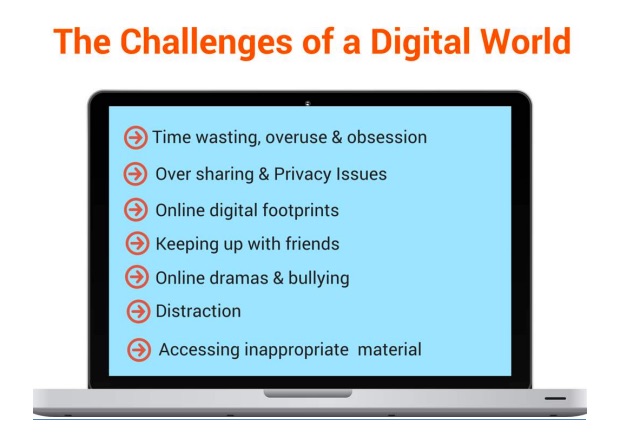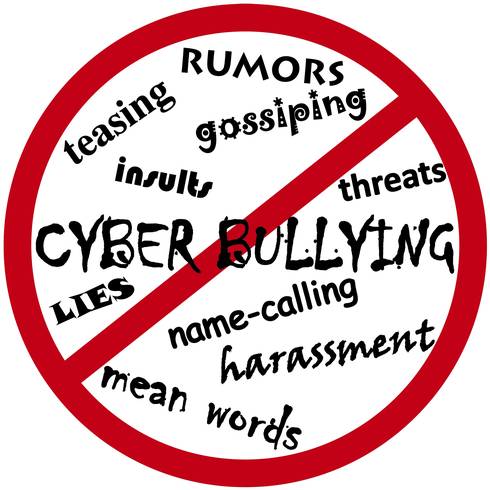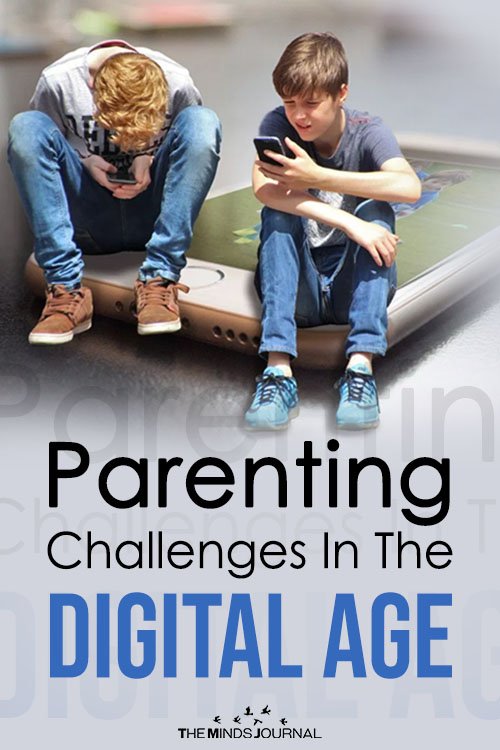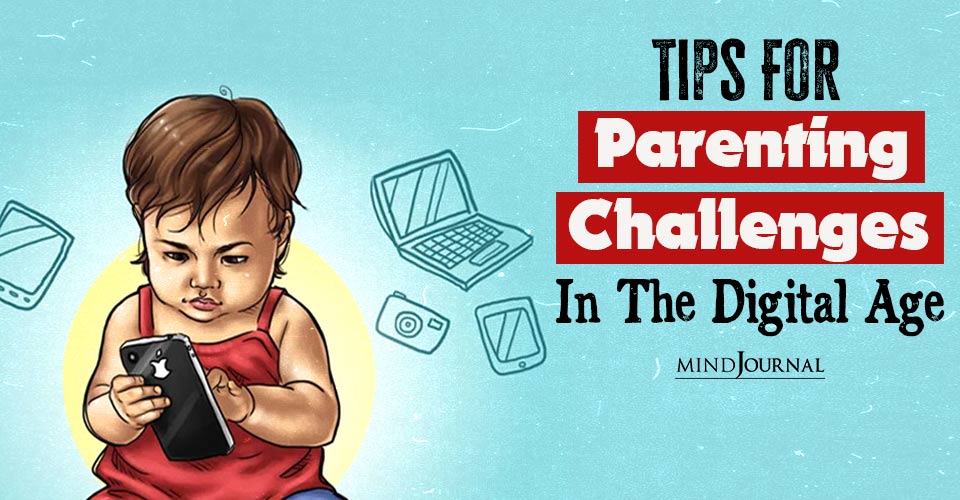In the fast-paced world of technological advancements, parenting challenges can come up. Below is a guide to dealing with the perils of parenting in the 21st century.
Apart from the age-old parenting challenges of protecting the child from dangerous people and situations, now the parents have a new challenge in dealing with cyberbullying, excessive screen time (TV computers and mobile phones), exposure of the children to multiple types of screens and apps etc.
They are also worried about protecting the children from harmful radiation from the gadgets they use.
Like the Industrial Revolution, the Digital Revolution marked a complete sift in our society. This alters many aspects of our lives.
Our society is now so defined by computers, smart phones , internet that hardly anyone can think of a world without these . This signals a new era with new needs and possibilities.
The digital revolution links individuals and groups together, no matter which part of the globe they are in. It is a catalyst for sharing ideas and thus revolutionized the whole system of education as well.
Similarly we now have a world of online opportunity. Startup companies can begin in a bedroom with a single laptop! Digital revolution forces competitiveness on a global scale.
Parenting Challenges: The Flipside Of Digital Revolution
Like the discovery and the use of fire, we need to handle the technology we use, carefully.

The unprecedented “Digital Revolution” is mostly driven by an addiction to convenience, speed, and instant gratification that could be compromising child development.
Children are exposed to a number of distractions like excessive texting, digital games, social media, and internet use continuously, compromising with the time of free play, sleep, and essential social interactions.
Digital technology promotes multi-tasking and very rapid information processing.
This weakens the brain’s ability to screen out distractions, to read with comprehension, and to contemplate. There is an “information overload” affecting the users. Most algorithms (apps and games) are designed to promote consumerism by appealing to the pleasure centers of the brain.
Media Guru Marshall Mc Luhan had predicted long time back:
“We become what we behold. We shape our tools and then our tools shape us.”
The digital age child is thus susceptible to internet and game addiction, and are found in a constant state of anxiety labeled “reward anticipation”.
Recognizing that the screen can be addictive, American Psychiatric Association (APA) added Internet Use Disorder (IUG) and Internet Gaming disorder (IGU) in the further study section of DSM 5 (Diagnostic and Statistical Manual of Mental disorders).
In some jurisdictions health regulations recommended a child under 2 years of age to receive no screen time (including TV) and under 5 years to be exposed to less than 1 hour.
According to WHO, children less than 1 year should not be exposed to any screen time at all.
However, one of the first things that needs to be acknowledged is that technology is here to stay and of course will continue to develop over the coming years.
Therefore, it is a good idea to have a strategy in relation to managing the use of technology and time spent online. It may be a relatively new concept, but more and more parents are going to need to add a digital element to their parenting style.
Read Top Reasons: How Parenting Makes You a Responsible Person
Cyber Bullying

Although bullying is not a new phenomenon, the internet has drastically changed the landscape of how schools, parents, and children must respond.
Previously, even a child who was dealing with severe bullying could at least escape into the safety of their home. Now, however, bullies can follow children into their safest spaces thanks to the internet connected devices that go everywhere with them.
Telling children to ignore a bully doesn’t necessarily work either – even if the devices are turned off, bullies can use the internet to spread hurtful messages or images that have a much wider reach than any note passed in class.
Be aware of your child’s school’s policy on cyber bullying, and stay alert for the signs that your child is being bullied.
The sooner the issue can be identified and addressed, the better chance you have of stopping it before it gets out of hand. It’s important to also be aware of your own child’s actions online.
Many children are both victims of and participating in cyber bullying themselves. Helping your child practice appropriate behavior online can prevent them from becoming a target.
Teach your child “If you can’t say something nice, don’t say anything at all” is a golden rule online.
How much screen time is too much?
It’s a complex question. Too much screen time may damage the brain, inhibit the ability to recognize emotions, and affect child development.
Simply banning internet-connected devices until a child reaches their teen or adult years is becoming less and less realistic. Computers, tablets, and smartphones have real value as educational tools as well as entertainment devices.
Also, digital communication is the new normal, and eschewing that entirely sets your child up for social isolation and fails to prepare them for adult life.
Balance is the key to managing screen time.
Children need firm limits on when and how much they can use their devices. Establishing these limits now will help them learn to set limits for themselves later in life.
They also need encouragement to participate in offline, non-screen based activities
Use the downtime to look at some things together online – if you’re on a ski vacation, how about checking out the history of skiing?
Introducing the use of internet through an “internet class’’ in schools would be a good idea to follow.
The Internet Safety Rules For Kids
Teach your child how to stay safe on social media and in apps. They should know how to hide their personal information and how to report and block any inappropriate communications they receive in a given online environment.
9 Tips For Parenting In The Digital Age
Modern parents need to encompass some new sets of skills in their parenting style.
1. Communication
Parent Zone suggests the WWW approach to communicating with your child.
Ask:
- Who is your child talking to online (classmates, friends in town/abroad, strangers)?
- What is your child doing online?
- Where are they going online (a type of websites, platforms, etc.)?
- When is your child going online (with the sitter, grandparents, late at night, etc.)?
2. Active Mediation In Communication
Active mediation essentially means ensuring that your child knows it is ok to come to you to talk about what they are experiencing online, without fear that they will be punished.
Active mediation is particularly important when it comes to the use of the internet because children and indeed teens can encounter situations such as witnessing a cyberbullying incident while online, or come across a porn site at an inappropriate age and will need to feel secure in being able to discuss this with you without fear of sanction.
3. Critical Thinking
Put the thinking caps on and decide whether your family needs that new device, game, app, robot or what have you. Once you say yes, think of ways to use the technology or device safely and responsibly.
Then think of ways to maximize your privacy and data protection settings.
Rinse, repeat. Talk to your child about the pros and cons of using a device before you hand him/her a device, say for example a smart phone.
Do not assume that he /she knows the perfect use of it.
4. Avoid Confiscating Devices
Parents can often confiscate or ban the use of digital devices as a form of punishment.
This is rarely, if ever, effective and in some cases can lead to children using digital devices in other people’s homes or borrowing smartphones from friends to access the internet.
It is human nature that if something is banned, it becomes more intriguing!
5. Confidence
Digital parents – have confidence that you really can do this!
Even if you start to panic thinking about all the fan culture of the Forties (those darn dances) or the latest YouTube, think that perhaps our parents and grandparents felt the same way when faced with Madonna in the ’80s or The Beatles in the ’60s.
We shall learn to handle this as well without anxiety or confusion.
6. Continued Conversation
Once you have begun to have those conversations with your children and young people, do keep them up .
Use that downtime in the car, while cleaning up, prepping for dinner or just talking a walk – to continue the conversations about their online world. Talk early and talk Often.
Read Stop Screaming At Your Child
7. Encourage and promote a healthy online/offline balance
Ultimately children learn through observation. If you want your child to have a healthy relationship with the digital world then you will need to be a good role model.
For example, where screen time is concerned, if you are constantly on a digital device or regularly on screens late at night then it is highly likely that your child will see this as normal and model this behavior.
In a broader sense make sure to regularly engage in family activities that do not include digital devices. Remind your child of the importance of communicating face to face with friends and relatives as opposed to doing so online.
8. Digital Detox
This is just shutting down turning off or stepping away from technology, periodically. It gives our mind and body the much needed break to recover from the effects overindulgence. You can declare a “Detox day” for the family and follow through. The benefits might surprise you.
9. Community
When parents have concerns, they may sometimes turn to family members other parents, or professionals (child psychologists/teachers, etc.) to resolve the issue.
A community of parents and caregivers with years of experience and common sense can be a valuable source.
In today’s world, the community can be found online as well. There are several Facebook groups dedicated to technology and digital parenting.
Read 12 Signs of Bad Parenting! Are You One of Them?
Join one or all and check out the conversations to find a community that resonates with you.
- Out Tech Your Child (from Cool Mom Tech)
- The Digital Parenting Community (led by E-safety Consultant, Elizabeth Milovidov)
- Parenting in the Wired World (from Wired Magazine)
- iParent101.com (led by a clinical psychologist, Dr. Adam Pletter)
With all the right resources parents shall be ready to raise the next generation of resilient, responsible and digitally aware children, making the future of “digital revolution” bright.
Parenting in a digital age can be a daunting experience but with the right steps, you can build a healthy relationship with your child and look forward to their successful future.











Leave a Reply